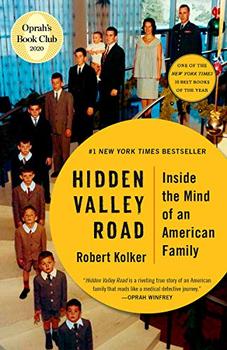Summary | Excerpt | Reading Guide | Reviews | Beyond the Book | Readalikes | Genres & Themes | Author Bio

Inside the Mind of an American Family
by Robert KolkerPrologue
1972 | Colorado Springs, Colorado
A brother and sister walk out of their house together, through the patio door that opens out from the family kitchen and into their backyard. They're a strange pair. Donald Galvin is twenty-seven years old with deep-set eyes, his head shaved completely bald, his chin showing off the beginnings of a biblically scruffy beard. Mary Galvin is seven, half his height, with white-blond hair and a button nose.
The Galvin family lives in the Woodmen Valley, an expanse of forest and farmland nestled between the steep hills and sandstone mesas of central Colorado. Their yard smells of sweet pine, fresh and earthy. Near the patio, juncos and blue jays dart around a rock garden where the family's pet, a goshawk named Atholl, stands guard in a mews their father built years ago. With the little girl leading the way, the sister and brother pass by the mews and climb up a small hill, stepping over lichen-covered rocks they both know by heart.
There are ten children between Mary and Donald in age—twelve Galvin kids in all; enough, their father enjoys joking, for a football team. The others have found excuses to be as far from Donald as possible. Those not old enough to have moved away are playing hockey or soccer or baseball. Mary's sister, Margaret—the only other girl, and the sibling closest to Mary in age—might be with the Skarke girls next door, or down the road at the Shoptaughs'. But Mary, still in second grade, often has nowhere to go after school but home, and no one to look after her but Donald.
Everything about Donald confounds Mary, starting with his shaved head and continuing with what he likes most to wear: a reddish brown bedsheet, worn in the style of a monk. Sometimes he completes the outfit with a plastic bow and arrow that his little brothers once played with. In any weather, Donald walks the neighborhood dressed this way, mile after mile, all day and into the night—down their street, the unpaved Hidden Valley Road, past the convent and the dairy farm in the Woodmen Valley, along the shoulders and onto the median strips of highways. He often stops at the grounds of the United States Air Force Academy, where their father once worked, and where many people now pretend not to recognize him. And closer to home, Donald has stood sentry as children play in the yard of the local elementary school, announcing in his soft, almost Irish lilt that he is their new teacher. He only stops when the principal demands that he stay away. In those moments, Mary, a second-grader, is sorrier than ever that her world is so small that everyone knows that she is Donald's sister.
Mary's mother is well practiced at laughing off moments like these, behaving as if nothing is strange. To do anything else would be the same as admitting that she lacks any real control over the situation—that she cannot understand what is happening in her house, much less know how to stop it. Mary, in turn, has no choice but to not react at all to Donald. She notices how closely both her mother and father monitor all of their children now for warning signs: Peter with his rebellion, Brian and his drugs, Richard getting expelled, Jim picking fights, Michael checking out completely. To complain or cry or show any emotion at all, Mary knows, will send the message that something might be wrong with her, too.
And the fact is that the days when Mary sees Donald in that bedsheet are better than some of the other days. Sometimes after school, she comes home to find Donald in the middle of an undertaking only he can understand—like transplanting every last piece of furniture out of the house and into the backyard, or pouring salt into the aquarium and poisoning all the fish. Other times, he is in the bathroom, vomiting his medications: Stelazine and Thorazine and Haldol and Prolixin and Artane. Sometimes he is sitting in the middle of the living room quietly, completely naked. Sometimes the police are there, summoned by their mother, after hostilities have broken out between Donald and one or more of his brothers.
Excerpted from Hidden Valley Road by Robert Kolker. Copyright © 2020 by Robert Kolker. All rights reserved. No part of this excerpt may be reproduced or reprinted without permission in writing from the publisher.
If there is anything more dangerous to the life of the mind than having no independent commitment to ideas...
Click Here to find out who said this, as well as discovering other famous literary quotes!
Your guide toexceptional books
BookBrowse seeks out and recommends the best in contemporary fiction and nonfiction—books that not only engage and entertain but also deepen our understanding of ourselves and the world around us.